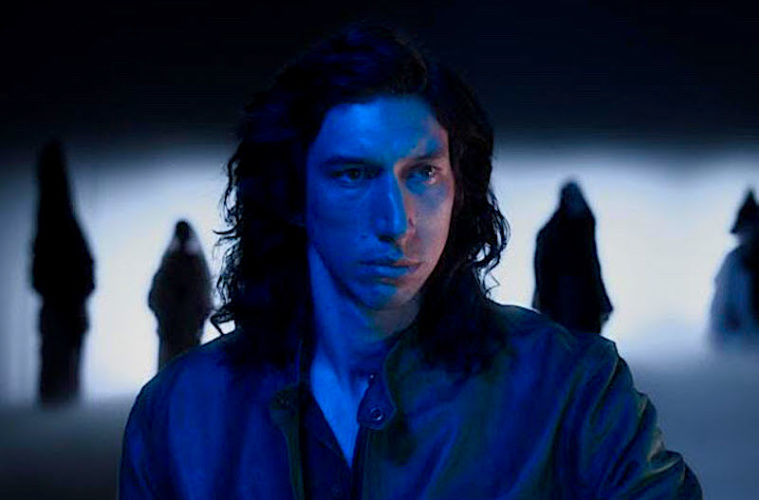 It’s a rare thing– a movie you have more difficulty pegging after you’ve seen it. Leos Carax’s new film Annette is a self-knowing whatzit, a restless and disingenuous game played with genre and celebrity, and you’d be well warned to lay expectations aside, particularly if they involve your ardor for Adam Driver. It’s a musical, and some kind of excoriation of show biz fame, and sort of an anti-love story. But it’s also a Carax movie, which means risky and outrageous set-pieces triumph over common sense, and filmmaking brio–the kind that seeks to muster things you’ve never seen before–is the main attraction.
It’s a rare thing– a movie you have more difficulty pegging after you’ve seen it. Leos Carax’s new film Annette is a self-knowing whatzit, a restless and disingenuous game played with genre and celebrity, and you’d be well warned to lay expectations aside, particularly if they involve your ardor for Adam Driver. It’s a musical, and some kind of excoriation of show biz fame, and sort of an anti-love story. But it’s also a Carax movie, which means risky and outrageous set-pieces triumph over common sense, and filmmaking brio–the kind that seeks to muster things you’ve never seen before–is the main attraction.
Set in an alt-L.A. with a weird French thrust, the movie winks at itself at a regular clip, beginning with the opening number, which sees Carax himself manning a recording studio board as Sparks (Ron and Russell Mael, the songwriters and co-screenwriters) launches into the inaugural tune and the cast jaunts outside singing, donning costumes and hopping into cars. Soon enough the story sort of presents itself in varying shades of A Star Is Born.
Driver is Henry, a comic-provocateur whose career is beginning to wane, and Marion Cotillard is Ann, an opera diva on the ascent. The thin songs, thinly sung – dozens of them – flow relentlessly, from cinema’s first-ever musical tune sung during cunnilingus, to a baby delivery with the maternity team crooning “breathe in, breathe out” in four-piece harmony. The overall effect, as Carax had to know, is a charmless distancing, not unlike Henry’s act, which veers from muttered discontent to rants in search of a joke, all performed in a boxer’s robe and slippers.
Just when you thought, ‘what this movie could use is a creepy puppet baby!’ Carax doubles down on the distance as Henry and Ann’s eponymous baby girl is in fact a jointed, robotic marionette, a Chucky cousin deliberately crafted as an off-puttingly artificial non-baby. If Annette has a master stroke, this is it: instead of a real baby/toddler hardly acting, we get a simulacra of infant-ness, a Jan Svankmajer-like metaphor for the crucibles of parenthood and childhood, with a doll’s built-in helplessness and uncomprehending gaze.
The story gallops into melodrama from there, which is Carax’s familiar terrain. As the couple’s careers diverge, tragedy strikes more than once, and the still-toddling Annette becomes an exploited “miracle” singing mega-star, while Henry’s nihilistic malaise drags the story toward doom and the inevitable stab at redemption.
Each of the director’s films are set on Planet Carax, where extravagance and contrivance go hand in glove; Annette can be dazzling but also tiresomely off-the-mark, especially when lampooning modern celebrity and cancel culture, about which Carax apparently knows very little. Henry’s grumpy “Ape of God” stage act, for instance, resembles no schtick any crowd would tolerate for long (you can’t be sure it’s trying to be comedy, really), and Driver marches through the film’s odd and demanding paces with a passionless singing voice and the demeanor of a DMV clerk. (Here, with this hair, he’s the first movie star to be “separated at birth” with Lionel Salem, the actor who played the orgy-exhausted Christ in the climax of Bunuel’s L’Age d’Or. Henry also has a wine-dark birthmark on his face that gets bigger as time goes on.)
The airy songs by Sparks, whose 50-year career as pop-makers has always been mostly Euro-inflected and Euro-beloved, don’t land terribly well, either, paling in terms of zest and charisma when compared to, say, the Belle & Sebastian songs in God Help the Girl, or even the numbers in La La Land. In fact, Carax displayed a savvier musical sense in the famous “Modern Love” tracking shot in Mauvais Sang (1986), and with the one stray Sparks song, sung by Kylie Minogue, in his last film, Holy Motors (2012). Music-video-ness sometimes takes over, largely because Carax’s layered visual busy-ness is so intense and inventive. At some points – and Carax’s is a film that comes at you in discreet design-chunks and splats of greenscreen surrealism – you begin to think this is our 21st-century equivalent to Ken Russell’s lurid 1975 filmization of Tommy, but without the energy of The Who.
I haven’t even mentioned Simon Helberg, whose sidekick role as Henry’s sorrowful conductor buddy shines during a handful of solo scenes, given that the character’s uncertainty and melancholia are far more resonant than Henry’s rather dull hostile narcissism. Beyond that, the movie doesn’t really have a cast so much as an array of Greek choruses, audiences that watch and sing in response, often in rage.
Ultimately, like all of Carax’s movies, Annette evolves, and devolves, away from its original footing as it goes, not exploring a thematic line but becoming only, messily, itself – that is, something we haven’t seen before. Or, it’s a self-reflexive stunt that grows into an abrasive absurdism. Ultimately, none of it matters as much as that puppet child, mutely watching the shambles of the adult world.
Advertising disclosure: We may receive compensation for some of the links in our stories. Thank you for supporting LA Weekly and our advertisers.

